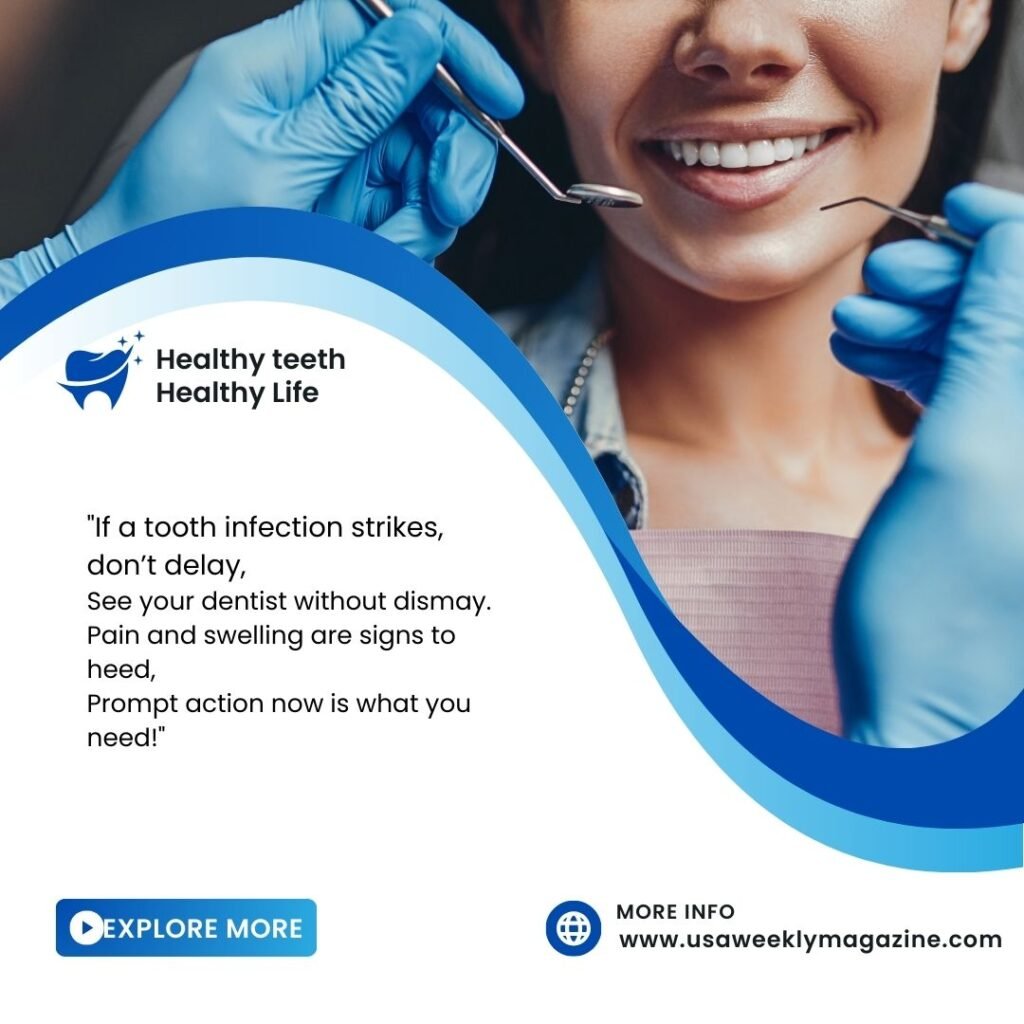“Tooth Infection” is an article that discusses all you need to know about these infections, starting with their causes, symptoms, how to prevent them, and possible treatments. Infections usually result from untreated cavities, gum disease, or trauma to the tooth and can be dangerous if left untreated. The article presents how one can manage the infection by using natural tooth infection remedy and antibiotics. It also discusses whether one should pull out the infected tooth or not. Among the critical points for you are that you must practice good oral hygiene, go for medical check-ups regularly, and seek medical attention whenever you notice something unusual. & few people are also looking for the answers to these questions. What is a natural antibiotic for tooth infection? And What is bone graft tooth infection? Eventually, it enhances a patient’s knowledge of how to care for the oral and prevent life-threatening conditions resulting from these infections.
Introduction
A tooth infection, or a dental abscess, is a common oral problem that causes severe pain and may lead to adverse health conditions if left unattended. The ideal approach of this article is to enlighten and educate the reader about a tooth infection. The article should address the causes of a tooth infection, symptoms, prevention plans, and natural tooth infection remedy. Additionally, the article must address the available remedies and options to consider before one can think of tooth extraction. Furthermore, the article should address this question: When is an infection too late for the dentist, and will a dentist pull an infected tooth?

The causes of Tooth Infection
Typically, these infections occur due to bacteria penetrating its inner structures. The following are the most common causes:
1. Untreated cavities: When a cavity is not treated immediately, the bacterium penetrates deeper into the tooth, reaching the pulp and causing infection.
2. Gum disease: Often, the severe form of gum disease known as periodontitis forces gum tissue to “run” away from the teeth, forming a pocket into which bacteria enter, and infection develops
3. Dental trauma: When teeth have cracks or fractures, bacteria can enter and cause infection. Such situations can occur due to injury or grinding.
4. Poor Oral hygiene: Inadequate brushing and flossing lead to plaque formation, which causes cavities and gum diseases, conditions that allow infections, including Tooth Infection.
5. A poor immune system: Diabetes, HIV/AIDS, and specific medications also allow for infections.
Tooth Infection Symptoms
These can be seen through various symptoms mentioned below.
- Severe toothache: The pain is significant, resulting in a pounding sensation that may extend down the jaw, neck, or ear.
- Mouth pain: It may harm others to eat hot meals.
- Swelling and redness: The face and cheek may swell near the tooth, and the gums might turn red.
- Fever: A fever may indicate a tooth infection has elevated.
- Bad taste or smell: The bad flavor in the tongue and foul breath are two of the main reasons for this. The pus that flows from the diseased tooth is to blame.
- Difficulty Chewing or Spitting: Eating is difficult, particularly foods that require pressure on the infected tooth.
Complications of tooth infection
Finally, there are dangerous consequences of tooth infection. When infected with tooth bacteria, one might develop areas that cause skin and surrounding tissues. In severe situations, dental infections become uncontrollable and spread to adjacent places. The infection may become blood-borne in severe conditions, leading to sepsis. Additionally, once an infection damages the dental structure, one can no longer fix it, and the tooth must be removed from the body. Another complication is the Infection of the upper teeth that damages the sinuses. It is a life-threatening condition called lumps angina. A tooth infection can also affect the bone. This is dangerous because the infected tooth removal may require a bone graft tooth infection, which is risky if the bone is infected.
Tooth Infection Prevention Measures
These infections can be prevented by practicing good oral hygiene and visiting your dentist consistently. To avoid developing infections, these measures should be taken:
- Regular brushing and flossing: It is essential for individuals to brush at least twice a day using fluoride toothpaste and floss daily. It will remove plaque and food particles and prevent tooth infections.
- Regular visits to the dentist: Check for cavities and gum disease and seek treatment to avoid tooth infections.
- Healthy food: Avoid candies and sodas, which have been linked to tooth decay and cavities. Eat fruits, vegetables, and whole grains to reduce the risk of developing tooth infections.
- Guarding: Sports impacts can cause tooth infections, especially when the jaw or upper front teeth are involved. Crushing objects like popcorn and ice exposes the teeth more.
- Dental issues: To avoid tooth infections, take care of cavities or other dental problems.
Tooth Infection Treatment Options
The type of treatment for infection depends on the severity of the condition. The following are some of the usual treatment methods:
1. Antibiotics: these are often confined to minor infections. A dentist will give you prescription antibiotics to help kill the bacteria responsible for the infection.
2. Drainage of an Abscess: If your infection has a visible abscess, a dentist may have to make an incision to drain the pus. This may facilitate the relief of pain and decrease the swelling of the infection.
3. Root canal: this may be done to remove the infected pulp from the tooth, clean the root canals, and seal the cleaned roots from the possibility of any further infection.
4. Tooth extraction: when the tooth is too compromised to be saved from the damage, removing it is the only alternative to stop an infection from spreading. People may ask, ‘‘will a dentist pull a tooth that hurts?’’ The dentist will pull a tooth that is infected if it is deemed as beyond saving and can propagate an infection.
5. Pain relief: over-the-counter pain medication, such as ibuprofen or acetaminophen, can be used to alleviate pain and reduce inflammation while waiting for a more definitive dental procedure to treat infection.

What is a bone graft tooth Infection
A bone graft tooth infection is caused by bacteria infecting the area of a dental procedure (tooth extraction, implant surgery) where the bone has been grafted. Bone graft — helps grow bone and adds support for dental implants or fills in areas where teeth are lost. Similarly, infections might occur due to bacterial contamination during surgery, poor oral hygiene, and a compromised immune system. Peripheral artery disease risk can also be raised due to smoking, which hurts the blood flow and makes healing more difficult. Signs of bone graft tooth infection: redness or warmth around the graft site, swelling, increased pain; often some pus and foul odor. This can result in soreness and a hard time chewing or speaking. Treatment usually involves antibiotics to clear the bone graft tooth infection. In case of extensive infection, surgical drainage or removal of the graft material may be obligatory. You will also need to be prepared for pain management after the operation. Getting post-operative care instructions from your dentist, keeping oral hygiene optimal, and visiting the dental clinic regularly to avoid infection is essential. Additionally, it lowers the chances of getting infected with no smoking. A bone graft tooth infection concerns immediate consultation with Dentist to avoid severe consequences and guarantee non-surgical therapy.
Natural tooth infection remedy
Natural Tooth Infection Remedy If you are looking for infection remedy and want it to be natural, there are several other remedies to alleviate your discomfort:
1. Saltwater Rinsing: Saltwater rinses can help reduce inflammation, disinfect the area, and enable the healing process; thus, this is an effective natural tooth infection remedy. To make this, mix half a teaspoon of salt into a glass of warm water and rinse with them multiple times a day.
2. Cold compress: A cold appliance was applied externally to the cheek to reduce swelling and escape the numb infection pain. It is also an effective natural tooth infection remedy.
3. Garlic: Garlic has natural antibacterial properties. You can crush a garlic clove, release its juice, and put it on the infected tooth to treat infections. This natural tooth infection remedy also help you to get out from infection.
4. Clove oil: Clove oil is rich in analgesic and antiseptic properties. Apply a moderate amount to the tip of the aching teeth to relax the pain and avoid infection. This could be an effective natural tooth infection remedy.
5. Hydrogen peroxide rinse: When rinsed, a 3% hydrogen peroxide solution mixed with an equivalent part of water kills the bacteria and wound symptoms in the mouth, serving as a natural tooth infection remedy.
However, these treatments should be considered temporary and are no alternative to the professional dental clinic. If a tooth infection is suspected, an entity should visit the dentist. What Do Garlic Cloves Do to Infected Tooth? Garlic crushed into juice and applied to the infected areas can help kill the bacteria naturally. I do not recommend natural antibiotics to replace prescribed antimicrobials.
What is a natural antibiotic for tooth infection?
When the infection happens few people seek for the answer of the question that What is a natural antibiotic for tooth infection? Although natural substances cannot cure infections alone, they can be effective with medication. Thus, the natural antibiotic for tooth infection includes garlic, which is proven earlier to contain allicin, an antibacterial compound; oil of oregano, natural essential oil with high antibacterial activity, which can be applied to the infected area in the form of natural antibiotic for infection by diluting with a carrier oil; turmeric, which has anti-inflammatory and antibacterial potential; and can be combined with water to form a paste that can be applied in the infected area in case of tooth infection. However, they are not alternatives to antibiotics prescribed by a doctor, mainly in cases of a severe infection. Therefore, consulting with a professional before using natural remedies is crucial.
Should You Pull an Infected Tooth?
When to Pull an Infected Tooth: In cases where the root of a tooth has been infected and a tooth infection has caused substantial harm, tooth extraction may be an alternative. On the other hand, extraction is suggested if the tooth has been severely compromised by extensive infection, which may not be eradicated using antibiotics or a root canal.
When to Save the Tooth: The tooth has not been too damaged if the tooth structure remains reasonably intact and the infection is not widespread. In this case, the most acceptable choice could be root canal therapy. This procedure removes pulp that has been killed or infected and fills and seals the tooth to prevent further infection.
A dentist should be seen for an evaluation and treatment. Pulling the tooth out on one’s own is not to be attempted. This could cause infection to enter into other areas and result in severe pain. Hope the answer may clear the question that Should You Pull an Infected Tooth? With proper knowledge and consultations.
Conclusion
Tooth infections are a severe dental matter that can cause excruciating pain and even life-threatening complications if not dealt with immediate medical interventions. Therefore, understanding the causes of infection, early signs and symptoms, and the prevention measures and treatment options, including a natural tooth infection remedy and what is a natural antibiotic for tooth infection, is essential to curb dental illness. Orthodontic care, oral hygiene, and timely treatment of all dental diseases are the key preventive measures of the infection. However, you may become skeptical about pulling an infected tooth in severe cases. Please see a professional dentist to evaluate your condition. Most people ask, “will a dentist pull a tooth that is infected?” Yes, indeed, & looking to answer the question of what is a natural antibiotic for tooth infection and Should You Pull an Infected Tooth, in all the cases mentioned above, also to prevent an infection, such as a bone graft tooth infection. In case of a tooth infection, get immediate treatment to avoid further complicating factors. Following these guidelines, you can mitigate the pain and downsides associated with infections and maintain a smile for your future and the posterity.








